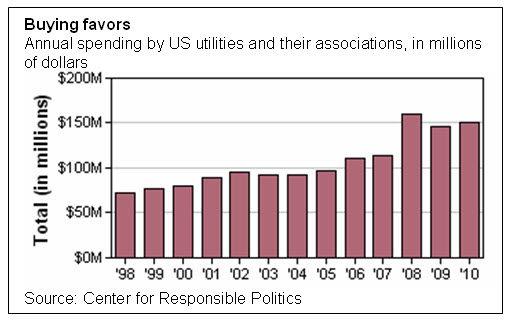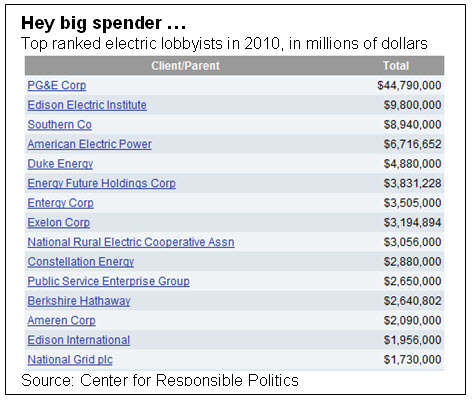This is a sample article from the February 2011 issue of EEnergy Informer.
Buying favors has never been cheap
The US electric utility industry spent a reported $151 million in 2010, most of it from a handful of large investor-owned utilities (IOUs) and their lobbying associations. The figure is probably conservative as it represents amounts spent specifically and directly on lobbying efforts. There is probably a lot more spent in “indirect” ways that are not reflected in these figures, including advertising and promotions.

Lobbying spending, while on an overall upward path (see graph on right), rises and falls depending on the number and complexity of issues facing the industry. The most remarkable thing about the 2010 data is that a single utility, PG&E Corp., the parent of Pacific Gas & Electric Company (PG&E) outspent the next eight biggest spenders (see table below). Even more surprising, it spent far more than the industry’s lobbying arm, the Edison Electric Institute (EEI).

Why such lavish spending by a single utility in a single year? The answer is PG&E’s ill-fated decision on California Proposition 16, which was defeated with a comfortable margin and made far more enemies than friends for PG&E. In 2009, PG&E was ranked #4 at a mere $6.3 million.
One can understand, if not entirely justify, the need for a lobbying association, such as EEI to spend $10m to buy favors in Washington. But why are individual utilities spending money on lobbying — even though the figures represent a miniscule percentage of their total revenues — apparently with little impunity, transparency or publicity? The answer, according to the lobbyists, is that is how things get done, or don’t get done, in Washington and in state capitals. Besides, they point out that most of the money comes from corporate earnings and companies can do as they please with their earnings in our free enterprise system.
So long as the shareholders don’t know or don’t care, lobbying will go on. As far as the 874 registered utility lobbyists are concerned, the more is the merrier.

